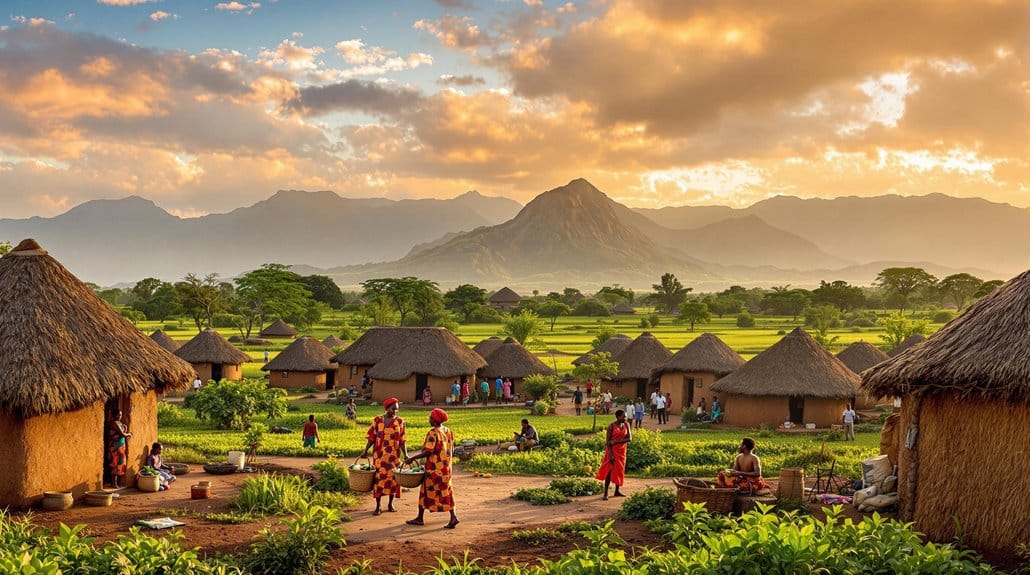Choosing sustainable travel in Kenya's communities enhances your experience while making a positive impact. You'll boost local economies, as your support helps artisans and funds crucial healthcare and education initiatives. Engaging in cultural exchanges deepens your understanding of vibrant traditions through workshops and storytelling. Plus, you play a role in wildlife conservation by staying in eco-friendly lodges that prioritize environmental protection. Community empowerment is key, giving locals the chance to thrive while preserving their heritage. By exploring these avenues, you'll truly connect with the essence of Kenya—stick around to discover even more ways to inspire change through your travels.
Key Takeaways
- Sustainable travel boosts local economies, creating jobs and supporting healthcare and education initiatives through tourism revenue.
- Engaging in cultural exchanges fosters mutual respect, while participating in local crafts deepens appreciation for Kenya's rich heritage.
- Wildlife conservation efforts are strengthened by community involvement, empowering locals to protect their environment and prevent poaching.
- Eco-friendly accommodations minimize environmental impact, promote renewable energy usage, and support local conservation projects.
- Education and awareness around sustainability are prioritized, ensuring tourists and communities collaborate for long-term ecological and cultural preservation.
Benefits of Sustainable Travel
When you choose sustainable travel in Kenya, you're not just enjoying breathtaking landscapes and vibrant cultures; you're also making a positive impact on local communities. By opting for sustainable tourism, you directly contribute to local economies, creating jobs and supporting community-based initiatives that involve over 6,000 local stakeholders. Your choice helps eco-lodges and conservancies thrive, ensuring that the benefits of tourism are shared widely.
Moreover, the revenue generated from eco-tourism plays a vital role in conservation efforts. The industry is expected to rebound to over $1.5 billion annually by 2024, providing essential funding for wildlife and habitat protection.
When you engage in responsible tourism practices, you also help preserve Kenya's rich cultural heritage, fostering authentic exchanges and supporting local artisans through your purchases of handmade goods.
Participating in eco-friendly practices while you travel reduces your ecological footprint, as many accommodations utilize renewable energy sources—over 70% of Kenya's electricity comes from renewables.
Your journey not only enriches your experience but also raises awareness about conservation issues, fostering a culture of responsibility that benefits both local communities and the stunning natural environment.
Engaging Local Cultures
When you engage with local cultures in Kenya, you reveal a world of rich traditions and artistic expressions.
Participating in cultural exchange opportunities, like handicraft workshops, not only supports local artisans but also deepens your understanding of their heritage.
Cultural Exchange Opportunities
Cultural exchange opportunities in Kenya's communities offer travelers a unique chance to immerse themselves in rich traditions and vibrant local customs. By participating in community-based tourism, you can engage directly with local cultures, fostering mutual understanding and respect for their diverse cultural heritage.
Imagine joining a Maasai warrior for a bush walk or taking part in a local handicraft workshop. These authentic cultural exchanges not only enrich your travel experience but also support local artisans and help preserve traditional practices.
Many eco-lodges and community-led tours provide storytelling sessions that reveal the history and values of the region, deepening your appreciation of its heritage.
Engaging in community projects, like supporting educational programs and local health initiatives, directly benefits residents and strengthens community ties. You can visit local markets and participate in traditional ceremonies, gaining insight into the everyday lives of Kenyan communities.
Empowering Local Artisans
Empowering local artisans in Kenya not only preserves traditional craftsmanship but also strengthens the economic fabric of communities.
By participating in sustainable travel, you can play a crucial role in this empowerment. Here's how you can make a difference:
- Shop Local: When you purchase handmade goods, you're directly supporting local artisans and ensuring that profits stay within the community, aiding health and education initiatives.
- Engage in Workshops: Join handicraft workshops to learn about the skills and stories behind each piece. This not only enhances your connection to local cultures but also fosters skills development among artisans.
- Promote Community Projects: Advocate for community-based tourism initiatives that provide platforms for artisans to showcase their work, creating sustainable income opportunities.
Wildlife Conservation Efforts
Wildlife conservation in Kenya is an essential endeavor that reflects the nation's commitment to preserving its rich biodiversity. With over 25% of Africa's large mammals calling Kenya home, your choice to engage in sustainable travel directly supports critical conservation projects.
When you visit, you become part of a larger movement that fosters protection for these magnificent species and their habitats.
Kenya's anti-poaching initiatives have made significant strides, reducing elephant poaching by 80% since 2013. Organizations like the Sheldrick Wildlife Trust operate facilities such as the Nairobi Elephant Nursery, where orphaned elephants receive care and rehabilitation.
By participating in eco-tourism, you help sustain these efforts.
Moreover, community conservancies play a key role in wildlife protection by involving local communities. This guarantees that their livelihoods are supported while fostering coexistence with wildlife.
When you travel sustainably, you contribute to these local economies and empower residents to safeguard their natural heritage.
Eco-Friendly Accommodations
When you choose eco-friendly accommodations in Kenya, you're not just enjoying a unique stay; you're actively supporting energy conservation and waste management efforts.
Many lodges harness renewable energy and implement recycling initiatives, greatly reducing their environmental impact.
Plus, by staying at these places, you help fund community support initiatives that empower local residents and protect wildlife.
Energy Conservation Practices
Eco-friendly accommodations in Kenya are at the forefront of energy conservation practices, making them an ideal choice for travelers seeking sustainable options.
By choosing these eco-friendly lodges, you support local initiatives that prioritize energy efficiency and reduce carbon footprints.
Here are three key energy conservation practices you can expect:
- Renewable Energy Sources: Many lodges utilize solar power, tapping into Kenya's commitment to sustainable energy, with over 70% of the country's electricity coming from renewable sources.
- Energy-Efficient Designs: Accommodations like Tawi Lodge and Porini Wilderness Safari feature designs that promote natural cooling and effective solar water heating, minimizing energy consumption.
- Community Support: Staying at these lodges means backing local efforts to promote energy conservation and sustainable travel, ultimately benefiting the community as a whole.
Waste Management Strategies
While exploring the stunning landscapes of Kenya, you'll find that many accommodations prioritize effective waste management strategies to minimize their environmental impact.
These eco-friendly accommodations implement thorough recycling programs and composting initiatives, ensuring waste is either reused or transformed, greatly reducing landfill contributions.
One standout example is Porini Wilderness Safari, which has adopted a zero waste policy. This commitment means that every piece of waste is responsibly managed, embodying the essence of sustainable practices.
Additionally, various eco-lodges utilize advanced wastewater management systems to treat and recycle water, promoting responsible use and lessening the strain on local resources.
In line with Kenya's strict regulations on single-use plastics in conservation areas, many lodges also favor biodegradable products, leading to a considerable decrease in plastic waste.
What's truly inspiring is how community-based eco-lodges engage local residents in these waste management efforts. By providing training and promoting sustainable practices, they not only benefit the environment but also enhance local livelihoods.
Choosing accommodations that embrace these strategies helps you support local communities while ensuring your travel leaves a positive footprint on Kenya's breathtaking landscapes.
Community Support Initiatives
Sustainable travel isn't just about enjoying nature; it's also about supporting the communities that protect it. When you choose eco-friendly accommodations in Kenya, you play a crucial role in strengthening local economies and promoting conservation efforts.
Here are three impactful ways these lodges benefit the community:
- Employment Opportunities: Many eco-lodges employ local residents, providing them with stable jobs and skills training, helping to uplift their livelihoods.
- Community Development: A portion of the profits from these accommodations often goes directly to local conservation projects and community development initiatives, ensuring that your stay contributes to a greater good.
- Cultural Exchange: Staying in eco-friendly lodges fosters meaningful interactions between travelers and local communities, enriching your experience while empowering residents through cultural exchanges.
Community Empowerment Initiatives
Community empowerment initiatives in Kenya play an essential role in enhancing local livelihoods and preserving cultural heritage. When you choose sustainable travel, you're not just visiting; you're actively participating in community empowerment. Over 6,000 local stakeholders engage in community-based tourism, ensuring that the revenue generated benefits the local Maasai and supports their daily lives.
Initiatives like lion-proof bomas exemplify this commitment, reducing conflicts between farmers and predators while empowering communities to protect their livestock. These solutions foster coexistence, showcasing the community's resilience and innovation.
By supporting eco-tourism, you're also opening doors for disadvantaged groups through employment opportunities, such as those provided by Kazuri Beads, which help increase local income.
Furthermore, financial contributions from tourism considerably impact healthcare and education. Organizations like Governors Camp play a pivotal role in funding local schools and medical clinics, ensuring essential services thrive.
As you engage with community-led tourism experiences, you'll connect authentically with local traditions and practices, witnessing firsthand the rich cultural heritage that binds these communities together.
Environmental Protection Practices
Embracing eco-friendly practices is essential for preserving Kenya's stunning landscapes and diverse wildlife.
By choosing sustainable travel, you're not just enjoying the beauty of the country; you're also supporting environmental protection initiatives that benefit local communities.
Here are three impactful practices you can engage with during your visit:
- Avoid single-use plastics: Since June 2020, Kenya has banned single-use plastics to reduce pollution in conservation areas. By bringing reusable items, you're helping protect the environment.
- Stay at eco-lodges: Many lodges, like Tawi Lodge and Porini Wilderness Safari, focus on waste management and recycling. Opting for these accommodations guarantees your stay supports eco-friendly practices.
- Use green travel options: Travel by train with Kenya Railways' Madaraka Express, which emphasizes reducing environmental impacts by promoting tree planting and sustainable travel.
Educational Travel Experiences
Travel in Kenya offers more than just breathtaking landscapes; it opens doors to enriching educational experiences that deepen your understanding of the country's vibrant culture. By engaging with local communities, you'll discover the rich heritage of over 42 official tribes, gaining insights into their traditions and practices.
Imagine participating in a bead stringing workshop with Maasai artisans—this hands-on experience not only empowers them but also preserves invaluable skills.
Many eco-lodges and community-based tourism initiatives provide educational programs that raise awareness about wildlife conservation and sustainable practices. By learning about the efforts of organizations like the Sheldrick Wildlife Trust, you become part of a movement focused on protecting orphaned elephants and their habitats.
These community-led tourism experiences offer a glimpse into the contemporary challenges faced by local populations, promoting responsible travel choices that support social and economic development.
When you choose educational travel experiences in Kenya, you're not just a visitor; you're an active participant in a sustainable future, building connections that matter while enriching your own journey.
Future of Sustainable Tourism
As the world increasingly prioritizes sustainability, the future of eco-tourism in Kenya looks promising.
You'll find that sustainable travel is becoming a crucial part of the nation's economic development strategy, with Kenya's Vision 2030 aiming to generate over $1.5 billion annually while preserving its natural and cultural heritage.
Here's what you can expect in the coming years:
- Community-Based Tourism: Local communities will play a larger role in eco-tourism initiatives, creating jobs and empowering locals to take charge of conservation efforts.
- Stricter Regulations: Anticipate more robust regulations that enforce sustainability standards, encouraging responsible travel habits among both visitors and operators.
- Increased Awareness: Education on sustainability will grow, fostering collaboration between tourists and local communities for long-term conservation.
Frequently Asked Questions
What Are the Advantages of Tourism in Kenya?
Tourism in Kenya offers you incredible advantages, from supporting wildlife conservation to fostering cultural exchange.
You're not just a visitor; you're empowering local communities by contributing to their economic benefits. Your travel dollars help create jobs and promote sustainable practices, ensuring that both the environment and local cultures thrive.
Engaging with local traditions enriches your experience while you play a crucial role in preserving Kenya's unique heritage for future generations.
Why Is Sustainable Travel so Important?
Sustainable travel's essential because it fosters cultural preservation, ensuring local traditions thrive.
By prioritizing environmental conservation, you help protect fragile ecosystems and wildlife.
It also drives economic development, creating jobs and supporting local businesses.
By choosing ethical responsibility in your travel choices, you contribute to a community's well-being and growth.
Ultimately, you're not just a visitor; you're part of a larger movement that values connection, respect, and sustainability for future generations.
Why Is Kenya a Suitable Destination for Ecotourism?
Kenya's a prime spot for ecotourism because it blends wildlife conservation with authentic cultural experiences.
As you explore eco-friendly accommodations, you'll engage with local communities, ensuring your visit supports their livelihoods.
You can witness conservation efforts firsthand, like those at the Sheldrick Wildlife Trust, and learn about the rich heritage of the region.
How Does Sustainable Tourism Help Local Communities?
Imagine a village where every footstep you take supports the heartbeat of the community.
Sustainable tourism empowers locals, giving them a voice in decisions that impact their lives. You'll witness economic benefits that flow directly into education and health services.
As you explore, you contribute to cultural preservation and environmental conservation, ensuring future generations thrive.
Your journey isn't just about experiencing Kenya; it's about belonging to a movement that uplifts and sustains.
Conclusion
By choosing sustainable travel in Kenya's communities, you're not just enjoying breathtaking landscapes and vibrant cultures; you're also making a positive impact. Did you know that sustainable tourism can increase local income by up to 30%? This means your visit directly supports community development and wildlife conservation efforts. Embrace eco-friendly accommodations and immerse yourself in local traditions, knowing you're helping preserve the beauty of Kenya for future generations. Together, we can make a difference while experiencing the adventure of a lifetime.








